严复中英文简介
- 格式:docx
- 大小:9.17 KB
- 文档页数:4
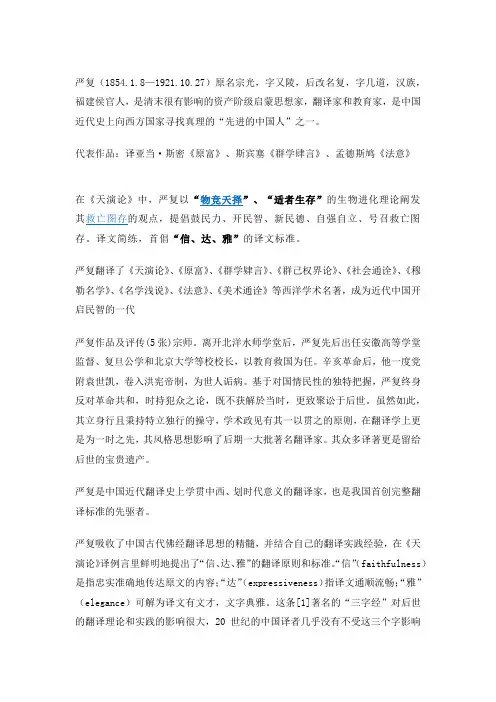
严复(1854.1.8—1921.10.27)原名宗光,字又陵,后改名复,字几道,汉族,福建侯官人,是清末很有影响的资产阶级启蒙思想家,翻译家和教育家,是中国近代史上向西方国家寻找真理的“先进的中国人”之一。
代表作品:译亚当·斯密《原富》、斯宾塞《群学肆言》、孟德斯鸠《法意》在《天演论》中,严复以“物竞天择”、“适者生存”的生物进化理论阐发其救亡图存的观点,提倡鼓民力、开民智、新民德、自强自立、号召救亡图存。
译文简练,首倡“信、达、雅”的译文标准。
严复翻译了《天演论》、《原富》、《群学肄言》、《群己权界论》、《社会通诠》、《穆勒名学》、《名学浅说》、《法意》、《美术通诠》等西洋学术名著,成为近代中国开启民智的一代严复作品及评传(5张)宗师。
离开北洋水师学堂后,严复先后出任安徽高等学堂监督、复旦公学和北京大学等校校长,以教育救国为任。
辛亥革命后,他一度党附袁世凯,卷入洪宪帝制,为世人诟病。
基于对国情民性的独特把握,严复终身反对革命共和,时持犯众之论,既不获解於当时,更致聚讼于后世。
虽然如此,其立身行且秉持特立独行的操守,学术政见有其一以贯之的原则,在翻译学上更是为一时之先,其风格思想影响了后期一大批著名翻译家。
其众多译著更是留给后世的宝贵遗产。
严复是中国近代翻译史上学贯中西、划时代意义的翻译家,也是我国首创完整翻译标准的先驱者。
严复吸收了中国古代佛经翻译思想的精髓,并结合自己的翻译实践经验,在《天演论》译例言里鲜明地提出了“信、达、雅”的翻译原则和标准。
“信”(faithfulness)是指忠实准确地传达原文的内容;“达”(expressiveness)指译文通顺流畅;“雅”(elegance)可解为译文有文才,文字典雅。
这条[1]著名的“三字经”对后世的翻译理论和实践的影响很大,20世纪的中国译者几乎没有不受这三个字影响的。
在翻译理论方面,严复最伟大的贡献在于,在《天演论·译例言》中,将三国时支谦《法句经序》中提到过的“信”、“达”、“雅”三字,按译事的内在规律排列组合,明确地将其作为“译事楷模”,成为“我国译界倡导系统而完整翻译标准的先驱”。
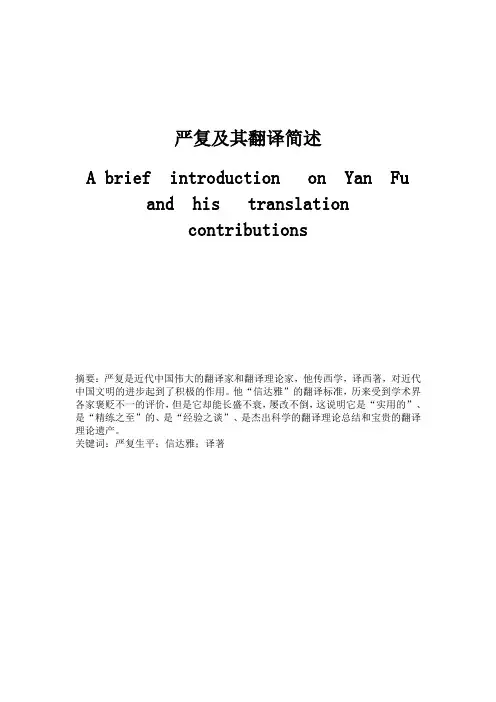
严复及其翻译简述A brief introduction on Yan Fuand his translationcontributions摘要:严复是近代中国伟大的翻译家和翻译理论家,他传西学,译西著,对近代中国文明的进步起到了积极的作用。
他“信达雅”的翻译标准,历来受到学术界各家褒贬不一的评价,但是它却能长盛不衰,屡改不倒,这说明它是“实用的”、是“精练之至”的、是“经验之谈”、是杰出科学的翻译理论总结和宝贵的翻译理论遗产。
关键词:严复生平;信达雅;译著Abstract: Yan Fu is a great modern enlightenment thinker in China. He raised the standard of translation: faithfulness expressiveness and elegance. It plays a great role in translation work. He had introduced and translated some famous western works to china. After reading his translating works, our Chinese have changed much more in thoughts. He also has made a great contribution to the development of china and played a great role in Chinese society’s advancing.Key words: Yan Fu; biography ; translation、; "faithfulness、expressiveness、elegance"目录引言------------------------------------------------------------------I 严复生平概述------------------------------------------------------II“信、达、雅”的探讨研究--------------------------------------------2.1“信、达、雅”的提出-----------------------------------------------2.2“信、达、雅”-----------------------------------------------------2.3“信、达、雅”褒贬之争---------------------------------------------III严复译著---------------------------------------------------------3.1严复译著在中国的影响----------------------------------------------3.2严复与“信、达、雅”翻译原则----------------------------------------结束语----------------------------------------------------------------参考文献--------------------------------------------------------------致谢-----------------------------------------------------------------Acknowledgements-----------------------------------------------------引言严复是近代中国系统地介绍西方资产阶级学术思想的第一人,他“信、达、雅”的翻译理论标准在我国及世界翻译界都具有举足轻重的影响力,国外众多学者也都将视线集中到了这位近代启蒙思想家,和对他“信、达、雅”翻译标准的研究上,对他先进思想及著名翻译理论的探讨研究,将会让我们在翻译工作中有一套更为完善的翻译技巧和方法,用来更加完善地做好我们的翻译工作,使我们的翻译工作日臻完善。
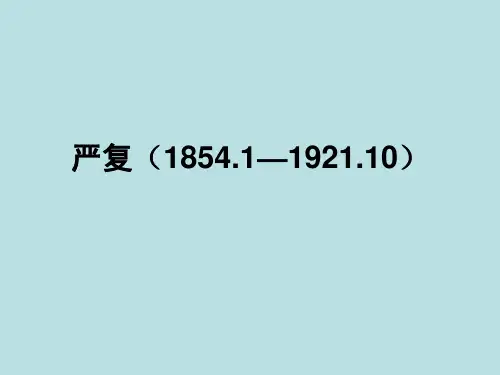
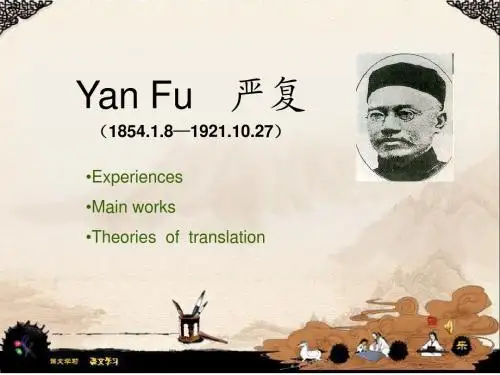

严复
严复(1854—1921年),字几道,又字又陵,福建侯官人,他是近代向西方寻找真理的代表人物,也是系统地在中国传播西学的资产阶级启蒙思想家、翻译家。
他是福州船政学堂第一届毕业生,后留学英国海军学校。
1880年任北洋水师学堂总教习,后升总办。
甲午中日战争后,他发表《原强》《救亡决论》和《辟韩》等一系列政治文章,发出爱国救亡的强烈呼声,主张维新变法,并着手译述英国自然科学家赫胥黎的著作,取名《天演论》。
该书系统介绍了达尔文的生物进化论,以“物竞天择,适者生存”的论点,号召人们救亡图存,“与天争胜”,对当时思想界起了很大影响。
戊戌变法前,他曾主办《国闻报》。
戊戌变法后,他翻译《原富》《群学肄言》《法意》等,传播西方资产阶级政治经济思想和逻辑学。
辛亥革命后,他思想日趋保守,1915年列名“筹安会”。
其著译编为《侯官严氏丛刊》《严译名著丛刊》。
《天演论》
《天演论》,清代严复译自英国赫胥黎所著《进化论与伦理学》一书。
“天演”即进化之意,“天演论”即进化论。
严复不赞成把自然规律(进化论)与人类关系(伦理学)加以分割,译述时只取前面“进化论”(即天演论)命书名。
严译《天演论》只包括赫胥黎原著中“序论”与“本论”两篇。
甲午战后,严复始译此书,1898年正式出版,为中国近代较早的一本直接介绍西方资产阶级理论著作的书。
严译《天演论》的特点不在于简单地转述赫胥黎原著,而是创造性地“取便发挥”,以求服务
于当时中国社会的需要。
书中“物竞天择,适者生存”的理论对打击封建势力、宣传变法维新起过积极作用。
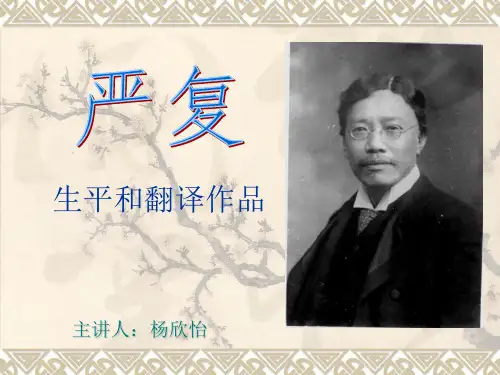

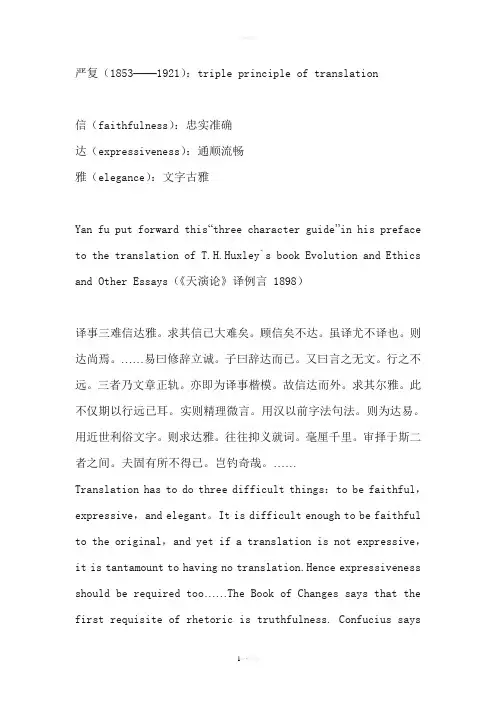
严复(1853——1921):triple principle of translation信(faithfulness):忠实准确达(expressiveness):通顺流畅雅(elegance):文字古雅Yan fu put forward this“three character guide”in his preface to the translation of T.H.Huxley`s book Evolution and Ethics and Other Essays(《天演论》译例言 1898)译事三难信达雅。
求其信已大难矣。
顾信矣不达。
虽译尤不译也。
则达尚焉。
……易曰修辞立诚。
子曰辞达而已。
又曰言之无文。
行之不远。
三者乃文章正轨。
亦即为译事楷模。
故信达而外。
求其尔雅。
此不仅期以行远已耳。
实则精理微言。
用汉以前字法句法。
则为达易。
用近世利俗文字。
则求达雅。
往往抑义就词。
毫厘千里。
审择于斯二者之间。
夫固有所不得已。
岂钓奇哉。
……Translation has to do three difficult things:to be faithful,expressive,and elegant。
It is difficult enough to be faithful to the original,and yet if a translation is not expressive,it is tantamount to having no translation.Hence expressiveness should be required too……The Book of Changes says that the first requisite of rhetoric is truthfulness. Confucius saysthat expressiveness is all that matters in language。
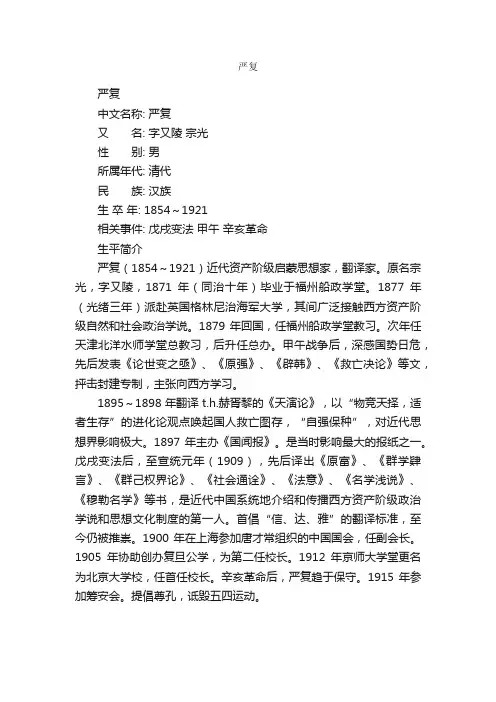
严复
严复
中文名称: 严复
又名: 字又陵宗光
性别: 男
所属年代: 清代
民族: 汉族
生卒年: 1854~1921
相关事件: 戊戌变法甲午辛亥革命
生平简介
严复(1854~1921)近代资产阶级启蒙思想家,翻译家。
原名宗光,字又陵,1871年(同治十年)毕业于福州船政学堂。
1877年(光绪三年)派赴英国格林尼治海军大学,其间广泛接触西方资产阶级自然和社会政治学说。
1879年回国,任福州船政学堂教习。
次年任天津北洋水师学堂总教习,后升任总办。
甲午战争后,深感国势日危,先后发表《论世变之亟》、《原强》、《辟韩》、《救亡决论》等文,抨击封建专制,主张向西方学习。
1895~1898年翻译t.h.赫胥黎的《天演论》,以“物竞天择,适者生存”的进化论观点唤起国人救亡图存,“自强保种”,对近代思想界影响极大。
1897年主办《国闻报》。
是当时影响最大的报纸之一。
戊戌变法后,至宣统元年(1909),先后译出《原富》、《群学肄言》、《群己权界论》、《社会通诠》、《法意》、《名学浅说》、《穆勒名学》等书,是近代中国系统地介绍和传播西方资产阶级政治学说和思想文化制度的第一人。
首倡“信、达、雅”的翻译标准,至今仍被推崇。
1900年在上海参加唐才常组织的中国国会,任副会长。
1905年协助创办复旦公学,为第二任校长。
1912年京师大学堂更名为北京大学校,任首任校长。
辛亥革命后,严复趋于保守。
1915年参加筹安会。
提倡尊孔,诋毁五四运动。
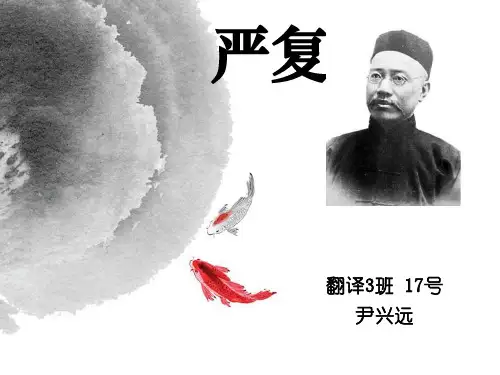
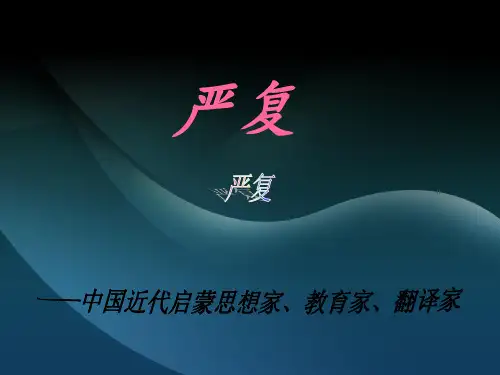
严复Yán Fù(1854-1921)Educator Pushes for ModernizationYan Fu was a great enlightenment thinker, translator and educator in China in the late 19thcentury. He was the first Chinese who systematically introduced modern Western ideas, scienceand philosophy into China in order to save and revitalize the nation. Today, Yan is still widelyremembered and revered among Chinese people as a "great master of enlightenment."Yan was born into a doctor's family in today's Fuzhou, capital of southeastern China's FujianProvince. As a child, he received a good traditional education with a focus on Confuciandoctrines. However, after his father passed away when he was only 14, the family's financialsituation declined and the teenager had to give up his preparation for the imperial civilexamination and enrolled at the Fujian Arsenal Academy in his home city.In 1876, he was sent to study naval techniques at the Navy Academy in Greenwich in England bythe government of the Qing Dynasty (1644-1911).During his study in England, he became extremely interested in the social and political systems inthat country. So, he spent considerable time reading books on political science, economics,natural sciences and philosophy. Especially, he was engrossed by Darwin's "natural selection"theory.Three years later, Yan returned to China, but only to find himself ill-prepared for the imperial civilexamination, the only channel leading to a career in officialdom in China at that time. So, instead,he became a teacher at the Fujian Arsenal Academy and then the Beiyang Navy School in Tianjinin northern China.It was not until China was defeated in the 1894-1895Sino-Japanese War that Yan began toadvocate social and political reform in China. He did so by introducing Western ideas andinstitutions in order to "strengthen the people's constitution, enlighten the people's wisdom andbring forth the people's new morality."To save his country from subjugation, Yan applied his understanding of Darwinism in the reformhe advocated and called for a gradual transformation in the thinking of the elite in Chinesesociety.Yan not only published a series of articles in local newspapers in Tianjin to promote social andpolitical reforms, but also concentrated on translating Western books, including Thomas Huxley's"Evolution and Ethics," Adam Smith's "Wealth of Nations," Herbert Spencer's "Study ofSociology," John Stuart Mill's "On Liberty" as well as Baron de Montesquieu's "The Spirit of theLaws."These works had an extensive and lasting influence on Chinese intellectuals at that time and inthe future.However, due to his obstinate belief in Darwinism, he was against drastic revolutions such as the1911 Revolution, which ended the feudalistic rule of more than 2,000 years in China.In 1912, he became the president of Peking University for a few months before he was forced toresign due to fierce factional conflicts. In his late years, Yan became increasingly conservative. Headvocated Confucianism and even called for reinstallation of the imperial throne.Yan was also known as a great translator. He explained the three most difficult aspects intranslation —faithfulness, expressiveness and elegance. He believed these are the sine qua nonof a good translation.Since then, Yan's definition of the three-word requirement has been adopted as the preferredstandards for any good translation among many Chinese translators.Yan became ill and died in 1921 in Fuzhou, his hometown, in southeast China.。
严复人物生平介绍清同治五年(1866年),以第一名考入福建船政局求是堂艺局(后改船政学堂)学习驾驶,五年期满毕业,先后到建威船和扬武舰实习。
光绪三年(1877年),为船政局派出第一批留英学生,先入抱士穆德大学肄业,后转格林威治海军学院。
在英期间,除学习海军专业外,留意观察英国的社会制度,研读西方社会科学书刊,比较中西学术政制的异同,深受达尔文《进化论》的影响。
光绪五年(1879年)归国,任福建船政局教习。
翌年,调任天津北洋水师学堂总教习,兼俄文馆总办。
任职期间,四度参加乡试均落第。
光绪十五年(1889年),捐得道员头衔,升为水师学堂会办;次年,升为总办,加叙海军副将。
中日甲午战争后,严复着手翻译外国社会科学著作,将《天演论》等书给国人。
光绪二十一年(1895年),在天津《直报》上先后发表《论世变之亟》、《原强》、《救亡决论》、《辟韩》等政论文章,宣扬西方科学技术和自由、平等学说,介绍达尔文进化论和斯宾塞社会学原理,批判韩愈君权神授论,提倡鼓民力、开民智、新民德,变法图强。
翌年,协助张元济在北京办通艺学堂,提倡西学。
次年,与人在天津创办《国闻报》,发表《上皇帝书》,主张学西学与民主自由,鼓吹变法自强。
光绪二十四年(1898年),德宗在百日维新期间召见严复。
变法失败,虽仍任天津学堂总办,但《国闻报》被查封。
光绪二十六年(1900年),避居上海。
同年七月,维新派人士在上海组织中国国会,被推为副会长。
光绪二十八年(1902年),任京师大学堂编译局总纂。
光绪三十年(1904年),因煤矿讼案往英办交涉。
在伦敦晤见孙中山,坚持改进,不赞同推翻帝制。
翌年八月,在-助马相伯创办复旦公学,后任安庆师范学堂监督。
光绪三十四年(1908年),再度进京,任学部审定名词馆总纂。
自甲午战争直到光绪末年,严复致力于翻译工作,主要译著有:赫胥黎《天演论》(1896~1898年),亚当斯密《原富》(1901年),斯宾塞《群学肄官》,约翰穆勒《群已权界论》、《名学》,甄克思《社会通诠》(1903年),孟德斯鸠《法意》(1904~1909年),耶芳斯《名学浅说》(1909年)等。
严复简介篇一:严复生平与思想简介作为《天演论》一书的翻译者,严复在中国思想史尤其是近代思想史中,占有显著的地位。
在甲午战争后民族危机空前严重的历史时期,他是第一个系统介绍西方学术、提倡资产阶级思想与文化,以挽救中国、达到富国强兵目的的资产阶级改良主义启蒙思想家,是近代以来“向西方国家寻找真理的先进人物”之一。
一生平大略严复(1854-1921年),福建侯官(今福州)人。
字又陵,又字几道。
他自幼聪颖,又受家学熏陶,有较好的古文功底。
长大后师事黄宗彝,对儒家经典有了更深入的了解。
十四岁时,因父亲去世,家道败落,不得不放弃科举入仕,转而入洋务派左宗棠、沈葆桢等创办的海军学校福州船厂附设的船政学堂,学习现代造船技术。
他对几何、代数、水重学、光学、电磁学、地质学、军事学、伦理学、音乐等学科知识都有涉猎。
1876年,严复被派往英国海军学校留学三年。
其间他的兴趣逐渐脱离本行,转移于西方的资本主义政制和哲学。
在这一时期,他对西方学术思想的了解非常广泛。
他不仅对西欧近代思想家如哥白尼、牛顿、康德、培根、霍布斯、洛克、笛卡尔等有所研究;而且对古代欧洲的思想家,如柏拉图、亚里士多德、伊璧鸠鲁、德谟克里特等,也有一定的了解。
而这些思想内容对严复影响最巨者,则是当时西欧盛行的资产阶级自由主义的经济、政治观点,在英国广泛传播的达尔文的进化论,以及哲学中的实证论、不可知论等主观唯心论思想。
这些见闻与学习经历,使得严复对资本主义社会的理解更为直接与深刻,比之康有为等资产阶级维新派仅靠间接得来的认识大不相同,以致郭嵩焘、吴汝纶、梁启超等都交口称自英国归来的严复“中西兼通”。
这一学术造诣上的特点,为严复在近代思想史上取得令人瞩目的成就奠定了基础。
回国一年后,严复被李鸿章调至北洋水师学堂,先后任总教习(教务长)、会办(副校长)、总办(校长)等职。
但从政治上来说,由于洋务派名为新政,实则与封建主义、帝国主义双方面妥协的本质,李鸿章对严复并不真正予以重用;而与此同时,严复对以李鸿章为首的洋务派也不满意。
严复(1854-1921)初名体乾、传初,改名宗光,字又陵,后又易名复,字几道,晚号愈野老人,别号尊疑,又署天演哲学家。
福建福州人。
特赐文科进士出身,中国近代资产阶级启蒙思想家、翻译家、教育家。
1866年以第一名考入马尾船政学堂,5年后以最佳成绩毕业后上军舰实习。
1877年作为首批海军留学生入英国皇家海军学院学习,在英国期间除学习海军专业外,还精心研读西方哲学、社会政治学著作,并到英国法庭考察审判过程,作中西异同比较。
学成归国后任福建船政学堂教习,翌年调任天津北洋水师学堂总教习,后升会办、总办。
甲午战败后严复感于时事弥艰,开始致力译著,并在天津《直报》上连续发表《论世变之亟》《原强》、《辟韩》、《救亡决论》等政论,斥责历代帝王是“大盗窃国者”,力主变法图强,以西方科学取代八股文章。
二十二年帮助张元济在北京创办通艺学堂,次年又与王修植、夏曾佑等在天津创办《国闻报》和《国闻汇编》。
二十四年九月,又撰《上光绪皇帝万言书》,极力倡导维新变法;同年,他翻译的第一部西方资产阶级学术名著《天演论》正式出版。
至1909年,先后又译出亚当斯密的《原富》、斯宾塞的《群学肄言》、约翰.穆勒的《群己权界论》、《穆勒名学》、甄克斯的《社会通诠》、孟德斯鸠的《法意》和耶方斯的《名学浅说》等西方名著,达160多万字。
他是近代中国系统翻译介绍西方资产阶级学术思想的第一人。
通过翻译《天演论》,将科学进化论带到中国,并便之超越达尔文生物进化论的范畴而具有了世界观的意义。
又通过翻译《穆勒名学》和《名学浅说》,将逻辑归纳法和演绎法介绍到中国,其中对培根的经验归纳法尤为重视,并猛烈抨击陆、王学派主观唯心主义的“心成之说”。
因此,严复是将中国哲学建立在近代科学基础之上、使中国近代哲学真正摆脱古代“经学”形式的划时代人物。
除译著外,他还倾心于教育事业。
光绪二十八年(1902)受聘为京师大学堂编译局总办;三十一年参与创办复旦公学,并于次年一度任校长;三十二年赴任安徽省师范学堂监督;1912年又任京师大学堂总监督,兼文科学长。
严复( 1853——1921):triple principle of translation
信(faithfulness):忠实准确
达(expressive nesS :通顺流畅
雅( eleganc^ :文字古雅
Yan fu put forward this “ threceharacter guide ” inhis preface to the
tran slati on of T.H.Huxley's book Evoluti on and Ethics and Other Essays
(《天演论》译例言1898)
译事三难信达雅。
求其信已大难矣。
顾信矣不达。
虽译尤不译也。
则达尚
焉。
……易曰修辞立诚。
子曰辞达而已。
又曰言之无文。
行之不远。
三者
乃文章正轨。
亦即为译事楷模。
故信达而外。
求其尔雅。
此不仅期以行远
已耳。
实则精理微言。
用汉以前字法句法。
则为达易。
用近世利俗文字。
则求达雅。
往往抑义就词。
毫厘千里。
审择于斯二者之间。
夫固有所不得
已。
岂钓奇哉。
……
Translation has to do three difficult things:to be faithful,expressive,
and elegant。
It is difficult enough to be faithful to the original ,and yet if
a translation is not expressive,it is tantamount to having no
translation.Hence expressiveness should be required too
The Book Changes says that the first requisite of rhetoric is truthfulness. Confucius
says that expressiveness is all that matters in language。
He adds that if
one's Ianguage lacks grace it won't go far.These three qualities then, are the criteria of good writing and, I believe, of good translation too.He nee besides faithfu In ess and expressive ness, I also aim at eleganee」strive for eleganee not just to make my translations travel far but to express the original writer's ideas better, for I find that subtle thoughts are better expressedin the vocabulary and syntax of pre-Han prose than those of the vulgar writings of today. Using the latter often leads to distortion of meaning, which, however slight, results in vast misunderstanding. Weighing the pros and cons I opted for the former, as a matter of necessity not trying to be different. ...................................................
Yan Fu
(simplified Chin ese:严复;
traditi onal Chinese 嚴復;
pinyin: Ydn F Q
Wade-Giles: Yen Fu;
courtesy n ame Ji Dao, 幾道;
8 Jan uary 1854—27 October 1921)
was a Chinese scholar and translator, most famous for introducing western ideas, in cludi ng Darwin's "n atural selection" to Chi na in the late 19th cen tury.
Life
Yan Fu studied at the Fujian Arsenal Academy (福州船政學堂)in Fuzhou, Fujian Provinee. In 1877 —9 he studied at the Navy Academy in Gree nwich, En gla nd. Upon his return to Chi na, he was un able to pass the
Imperial Civil Service Exam in ati on , while teach ing at the Fujia n Arse nal
Academy and then Beiyang Naval Officers' School (北洋水師學堂)at
It was not until after the Chinese defeat in the First Sino-Japanese War (1894 -95, fought for control of Korea) that Yan Fu became famous. He is celebrated for his translations, including Thomas Huxley's Evolution and Ethics, Adam Smith's Wealth of Natio ns, Joh n Stuart Mill's On Liberty and Herbert Spencers Study of Sociology. Yan critiqued the ideas of Darwin and others, offeri ng his own in terpretati ons.
The ideas of "natural selection" and "survival of the fittest" were in troduced to Chi nese readers through Huxley's work. The former idea was
famously rendered by Yan Fu into Chinese as a nZ天擇).
He became a respected scholar for his tra nslati ons, and became politically active. In 1895 he was invo Ived in the Gon gche Shang shu moveme ntl n 1912 he became the first principal of National Peking University (now Peking Uni versity).
Tran slati on theory
Yan stated in the preface to his translation of Evolution and Ethics (天演論)that "there are three difficulties in translation: faithfulness, expressiveness, and eleganee陀譯事三難:信達雅).He did not set them as general standards for translation and did not say that they were independent of each other. However, since the publication of that work, the phrase "faithfu In ess, expressive ness, and elega nee" has bee n attributed to Yan Fu as a standard for any good translation and has become a clich 岔Chinese academic circles, giving rise to numerous debates and theses. Some scholars argue that this dictum actually derived from British theoretician of translation, Alexander Fraser Tytler。